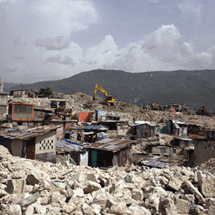
|
|
A view of Fort National in the Bel Air neighbourhood of Port-au-Prince, Haiti six months after an earthquake devastated the capital in January 2010. Photo: Sophia Paris/UN
|
-
Develop operational strategies early on that ensure multi-stakeholder partnerships for enhanced coordination, impact and effectiveness of humanitarian assistance in urban areas.
-
Strengthen technical surge capacity for emergency responses in urban-based challenges.
- Develop or adapt humanitarian approaches and tools for urban areas.
- Promote protection of vulnerable urban populations against violence and exploitation.
- Restore livelihoods and economic opportunities as a priority, starting in the emergency phase for expedited early recovery in urban areas.
- Build preparedness into humanitarian assistance policies for more effective emergency responses that save more lives and livelihoods in urban areas.
The Inter-Agency Standing Committee (IASC) is an inter-agency forum for coordination, policy development and decision-making involving the key UN and non-UN humanitarian partners. The IASC was established in June 1992 in response to United Nations General Assembly Resolution 46/182 on the strengthening of humanitarian assistance. General Assembly Resolution 48/57 affirmed its role as the primary mechanism for inter-agency coordination of humanitarian assistance. The IASC Working Group is composed of the directors of the Emergency Programmes of the IASC agencies or their equivalent counterparts.
For more information, please visit the IASC website and its page on the IASC Task Force that created the strategy on humanitarian aid in urban areas.




